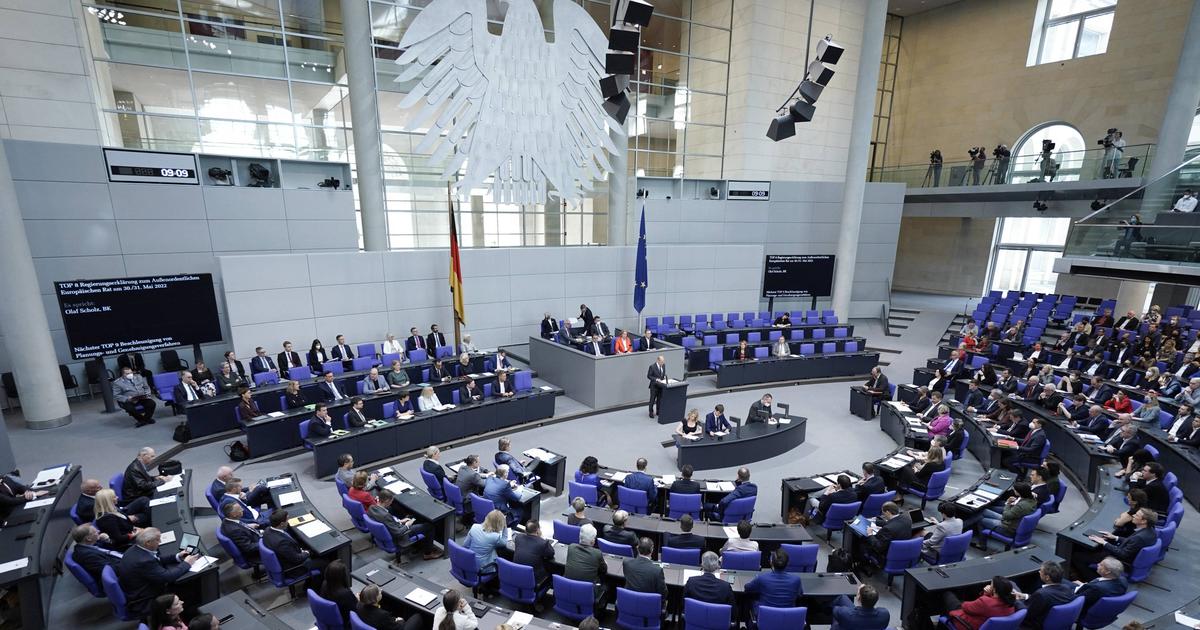Aurore Gaillet is a professor of public law at Toulouse 1 Capitole University (Research Institute in International, European and Comparative Law) and Junior member of the Institut Universitaire de France
.
FIGAROVOX. - On June 24, the German Parliament repealed a legislative provision which limited publicity and information on abortion and had led to the condemnation of several gynecologists. What was its content?
Aurora Gaillet. -
The norm that penalizes advertising for terminations of pregnancy dates back to a provision adopted in the first months of the Third Reich, in June 1933. It also results from a politico-legal debate that dates back to the Weimar Republic and the era of the German Empire.
§219a of the German Penal Code, abolished on June 24, 2022, had been amended several times, most recently in March 2019. It aimed to penalize with a “
custodial sentence of up to two years and a fine
"any person who, "
in public or through their writings
", "
proposes, announces, advertises or makes public statements tending to perform or promote termination of pregnancy
" or "
refer to means, objects or procedures capable of terminating a pregnancy
[…]”.
Successive revisions had admittedly made it possible to make a certain number of exceptions to this penalty;
but the provision remained in force, surrounded by certain ambiguities.
The 2019 revision thus exempted from the criminal offense doctors who limited themselves to publicizing their practice of abortion, but did not authorize them to provide precise information in this regard.
The constitutional debate brought together arguments based on the one hand on the professional freedom of doctors, the freedom of information and the right to self-determination of pregnant women, on the other hand on the protection of human dignity (decisive in German constitutional law) and the right to life.
Aurore Gaillet
Why and how was it decided to repeal this provision?
To understand the aforementioned revision of 2019, we must return to the conviction of Kristina Hänel: sentenced to a fine of 6000 euros for having indicated on her website her practice of abortion, this general practitioner from Gießen has become the symbol of fight for the relaxation of abortion laws.
His conviction also highlighted the legal uncertainties of the new (2019) wording of §219a, revealed by the diversity of interpretations adopted by the courts.
More broadly, the legal dispute focused on the legality (constitutionality, interpretation, scope) but also on the legitimacy of the offense provided for by §219a: how to understand that doctors can perform terminations of pregnancy, under the conditions provided for by the law (§218 et seq. of the Penal Code), but cannot provide precise information in this respect?
The constitutional debate brought together arguments based, on the one hand on the professional freedom of doctors, the freedom of information and the right to self-determination of pregnant women, on the other hand on the protection of human dignity (determining in German constitutional law) and on the right to life.
The German Federal Constitutional Court had not yet had the opportunity to rule on the matter.
Beyond that, Kristina Hänel's positions had fueled the social debate, also fueled by many doctors alerting to the limits of the care and care provided to the women concerned.
The Scholz government, in place since December 2021, then took over the intention to relax the legislation, an intention already formulated for a few years, in particular on the part of the former opposition parties, "Greens" and "Liberals" .
The new 2021 coalition contract clearly states: “
Doctors must be able to provide public information about terminations of pregnancy without being sued and fearing criminal prosecution.
That is why we are removing §219a from the German Penal Code
”.
The draft repeal was presented in January 2022 by the Minister of Justice, indicating that the ban on providing objective information relating to the termination of pregnancy was likely to complicate the choice of a doctor for women concerned.
The bill was passed by the Bundestag on June 24, 2022. All criminal convictions handed down since 1990 against doctors under the repealed provision will also be overturned, with retroactive effect – and the three constitutional complaints filed with the Federal Constitutional Court (against criminal judgments) have become inadmissible.
Abortion in Germany remains regulated by law. What is the current legislation in Germany regarding abortion?
In Germany, termination of pregnancy remains punishable by imprisonment or a fine under §§218 et seq.
of the Penal Code.
However, the penalty incurred by the doctor and the pregnant woman has many exceptions and limitations (§218a StGB).
A first law had been promulgated in 1974, but canceled by the Federal Constitutional Court, which, in its judgment of February 25, 1975, highlighted the intangibility of human life and the right to life.
Aurore Gaillet
To understand the political and legal framework, it is interesting to recall the oppositions that existed between the two former systems of the German Democratic Republic (GDR) (particularly flexible, allowing pregnancy interventions from 1972) and the Federal Republic of Germany (FRG), more conservative.
In West Germany, the debate had intensified in the 1970s, between those who recommended the legalization of abortion and those who advocated stricter regulation.
A first law had been promulgated in 1974, but canceled by the Federal Constitutional Court, which, in its judgment of February 25, 1975, highlighted the intangibility of human life and the right to life.
German unification in 1990 then unsurprisingly complicated the debate.
A new law, tending to partially decriminalize abortion, was then adopted in 1992, but once again annulled by the Federal Constitutional Court (judgment May 28, 1993).
The new law provides for the decriminalization of abortions performed during the first twelve weeks of pregnancy, but on the condition of submitting to consultations, which far from being neutral, must help the woman to take the decision to continue her pregnancy, and in l Absence of any coverage by the social insurance funds (unless the pregnancy is the consequence of rape or endangers the woman's life), abortion remains considered illegal.
Aurore Gaillet
These judgments are extremely important because they highlight the role of constitutional judges, who adopt a role of quasi-legislators by indicating the path to be followed by the legislator.
The latter has in fact largely endorsed the requirements laid down by the Court: the new law, promulgated in 1995 (late adoption which reveals the difficulties in adopting it), thus provides for the decriminalization of abortions performed during the first twelve weeks of pregnancy, but on the condition of submitting to consultations, which far from being neutral, must help the woman to take the decision to continue her pregnancy, and in the absence of any support by the social insurance funds (unless the pregnancy is the result of rape or endangers the life of the woman), abortion remains considered illegal.
Do you see a connection with the judgment of the Supreme Court of the United States handed down the same day?
The importance of the case law of the Federal Constitutional Court is obvious and one could indeed wonder about possible parallels with the American debate: it is the very day of the repeal of §219a of the German Criminal Code (June 24, 2022) that the Supreme Court reversed the landmark case of Roe v.
Wade of 1973 (upheld by
Planned Parenthood of southeastern Pennsylvania v. Casey,
rendered in 1992), removing the constitutional right to termination of pregnancy.
A big difference, however, is that in the United States, this right had no federal legislative basis, which gives much greater importance to the Supreme Court's jurisprudence.
The removal of the fragile base of a right only recognized by case law now opens the way to different regulations in each federated state.
In substance, the difference between the two situations is obviously due to the contrast between, on the one hand, the current trend to relax German legislation, and on the other hand, the toughening of the law in the United States, where the Minister of Justice , Merrick Garland was able to denounce a "
devastating blow to reproductive freedom
".
The Bundestag remains divided.
And, in organized civil society, the debate is in any case not closed
Aurore Gaillet
Parliament now wishes to consider other laws concerning abortion (in particular the one requiring women wishing to have an abortion to take part in a compulsory consultation in an approved centre). What will happen in the weeks and months to come? Is Parliament unanimous on this subject?
The Bundestag remains divided: the political groups CDU/CSU (conservative right) and AFD (extreme right/populist) did not support the repeal of §219a.
On the other hand, the current government, resulting from a coalition between the Social Democrats, the Liberals and the Greens, is more liberal than that of the previous legislation (Cabinet Merkel 2017-2021).
His coalition contract (entitled “
Oser plus de progress
”) commits him to putting in place a more liberal legislative framework, favorable to reproduction for all, which could lead to other discussions and other legal developments under this legislature. .
With regard to abortion, the maintenance of its illegal nature [but authorized as an exception during the first 12 weeks of pregnancy, editor's note] raises relative debates.
Without clearly taking sides in this debate, the government could have to concretize the intentions announced in its coalition contract, such as those of "
facilitating access to medical abortions
", "
strengthening women's right to self-determination
" .
, to integrate terminations of pregnancy into "
initial and continuing medical training
", to perform them free of charge within a "
reliable health system
" and "
set up a commission on reproductive self-determination and medically assisted procreation, which will be responsible for regulating the termination of pregnancy outside the Penal Code and legalizing oocyte donation and surrogacy
”.
Abandoning the compulsory consultation before a termination of pregnancy is not one of the government's ambitions.
However, online consultation and better offers for more comprehensive coverage are required by government policy.
Is German public opinion in favor of these legislative changes?
As often, opinions differ, but the majority opinion is rather in favor of the legislation.
Some nevertheless consider that it would be necessary to go further by improving information and the management of pregnancy interventions and by repealing the offense of abortion and the exceptional nature of abortion.
This discourse is currently taking place in organized civil society.
The debate is in any case not closed, and has perhaps even become livelier with regard to current developments in the United States.









